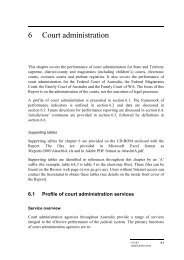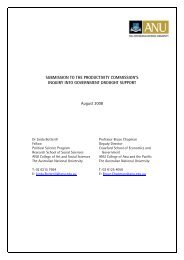Innovation & Business Skills Australia - Productivity Commission
Innovation & Business Skills Australia - Productivity Commission
Innovation & Business Skills Australia - Productivity Commission
You also want an ePaper? Increase the reach of your titles
YUMPU automatically turns print PDFs into web optimized ePapers that Google loves.
the different State and Territory jurisdictions. This concern is compounded by the<br />
fact that large numbers of RTOs operate across jurisdictional boundaries and face<br />
different regulatory and compliance requirements. These differences arise, not from<br />
any notion of competitive federalism, but rather from age old, even encrusted ways<br />
of doing things (“the culture of the system”).<br />
A good example relates to the roll out of the recently endorsed Certificate IV in<br />
Training and Assessment (TAE40110), which is being implemented differently<br />
between jurisdictions, in terms of how providers with the previous qualification on<br />
their scope of registration are treated. This means that RTOs operating in a<br />
particular jurisdiction may be enabled to deliver the new qualification much earlier<br />
than another RTO operating elsewhere. One would need to be elastic to suggest<br />
that this represented “competitive federalism”.<br />
The new national regulatory framework should improve this position, provided that all<br />
jurisdictions ultimately participate. This new framework, in itself, should not impact<br />
directly on the workforce, although it may impact on the way RTOs can operate.<br />
Registration of the VET workforce, potentially possible at a national level with a<br />
national regulator, would not in itself, necessarily lead to either an improvement in<br />
learning outcomes or improved professional standing and practice. Consistent with<br />
the comments above, this is more likely to occur with an increase in the opportunities<br />
and options available to the workforce in terms of associating with peers through<br />
networks or formal bodies, as well as expanding professional development and<br />
industry currency options.<br />
Conclusion<br />
IBSA emphasises that the VET workforce requires:<br />
• a strengthened set of agreed performance measures;<br />
• a substantially improved data base to enhance understanding and policy<br />
development;<br />
• greater opportunities to undertake higher level qualifications;<br />
• ongoing professional development options and opportunities: and<br />
• that such opportunities be delivered via the expansion of networks and<br />
bodies, to be resourced and supported by employers, the VET workforce itself<br />
and other industry players in the VET sector.<br />
11

















